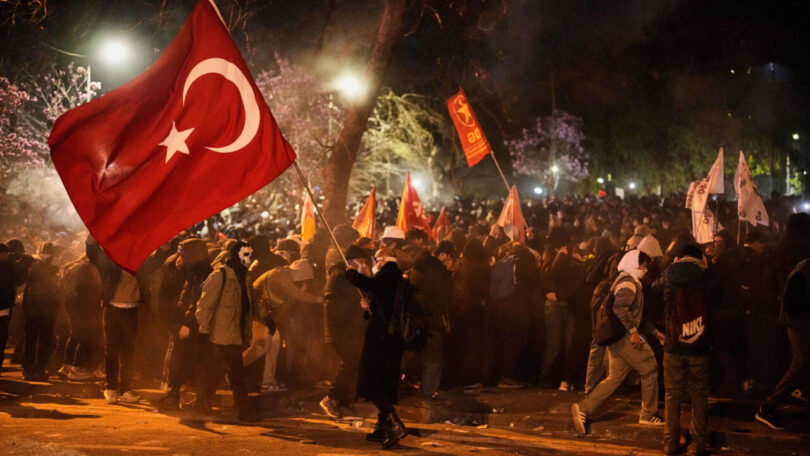By Tilbe Akan
Since March 18, Turkey has witnessed a new phase of attacks by the Palace Regime against the will of the people. The AKP-MHP government has launched a large-scale operation to eliminate political opponents, suppress opposition, and intimidate the public. Their goal is to prevent the people from organizing and resisting while maintaining the capitalist order and one-man rule. However, these attacks have only fueled public anger and strengthened resistance.
Meanwhile, another strong name within the CHP, Mansur Yavaş, follows a right-wing political line and aligns with the AKP on key issues such as workers’, women’s, LGBTQ+, and animal rights. This is why the so-called opposition fails to present a genuine alternative that resonates with the masses. On the other hand, İmamoğlu’s electoral successes in Istanbul pose a direct threat to Erdoğan. The governance of Istanbul plays a decisive role in Turkey’s political landscape, as the saying goes: “Whoever rules Istanbul, rules the country.” Erdoğan would much rather compete against Mansur Yavaş, as Yavaş lacks the ability to appeal to a broad base and, most importantly, has no chance of securing support from DEM, a key party with significant electoral power.
Trustees and Repression Against the Opposition
Another pretext for the government’s crackdown was the urban cooperation between CHP and the DEM Party. The two parties collaborated in certain municipalities during local elections, leading to AKP’s defeat. The cost of this was high: first, trustees were appointed to municipalities in Kurdistan, and then a broader suppression campaign against the opposition began. The appointment of a trustee to Esenyurt Municipality is a prime example of this assault. The state is not only targeting Kurds but also anyone who opposes the regime.
On the morning of March 19, İmamoğlu was detained on charges of “corruption” and “terrorism.” The Istanbul Chief Public Prosecutor’s Office labeled him a “suspect as the leader of a criminal organization.” In the same operation, 88 people, including Şişli Mayor Resul Ekrem Şahan and artist Ercan Saatçi, were also detained. Additionally, journalist İsmail Saymaz was arrested in connection with investigations targeting the Gezi Resistance. Saymaz was accused of “aiding an attempt to overthrow the Government of the Republic of Turkey” and was placed under house arrest.
In total, 106 people were detained. On March 21, the newly elected Istanbul Bar Association, composed of socialist, leftist, and Kurdish representatives, was dismissed. However, lawyers refused to back down and marched to Taksim Square as part of the growing resistance.
The Rise of Resistance and the Importance of Organized Struggle
These attacks are desperate moves by a government panicked at the prospect of losing power. No matter how much repression the regime imposes, public anger and resistance will continue to grow. The CHP’s attempts to pacify the masses have once again shown that establishment politics are not on the side of the people. Over the past three days, protests have erupted across Turkey, and despite the CHP’s efforts to turn these into mere party rallies, people have remained on the streets despite the party’s attempts to co-opt the movement. However, only through organization in workplaces, universities, and neighborhoods can this regime of oppression be dismantled.
Erdoğan has de facto abolished the fundamental democratic right to vote and be elected, even within the limits of bourgeois democracy. Today, no one in the country can feel secure about their university diploma, their money in the bank, or even the right of an animal to live on the streets. However, a people’s movement that refuses to back down in the face of attacks, that does not abandon the streets and public spaces, will continue to grow. The key is to channel this energy into an organized struggle against the one-man regime.
The Only Way to Break Oppression: Organize and Expand Resistance!
Important Notes:
- Gezi Resistance (2013): A series of mass protests that began in opposition to the demolition of Istanbul’s Gezi Park and quickly transformed into a broad anti-government movement. Despite heavy police violence and state repression, it remains one of the largest uprisings in Turkey’s history.
- Gezi Investigations: The government continues to target participants and supporters of the Gezi Resistance years later, charging them with “coup plotting” and “terrorism.”
- Ekrem İmamoğlu’s Electoral Victories:
- March 31, 2019: First elected as Istanbul Metropolitan Mayor.
- June 23, 2019: Won the re-election with an even larger margin after the Supreme Election Council (YSK) annulled the first vote.
- March 31, 2024: Re-elected with a one-million-vote lead over his opponent.
- Trustee Appointments: A tactic frequently used by the state to remove elected mayors and replace them with government-appointed officials, particularly in Kurdish municipalities.
- Dismissal of the Istanbul Bar Association: Bar associations in Turkey represent the collective strength of lawyers. The dismissal of the leftist and Kurdish-led administration is a move to tighten the government’s control over the judiciary.
Courtesy International Socialist League






